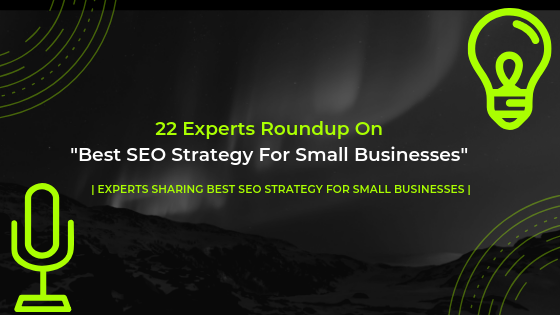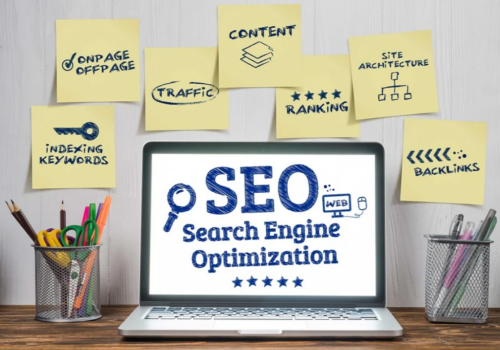In this post, we have actually featured Expert Roundup Post On- Best SEO Strategy For Small Business. SEO experts from all over the world is sharing their secret SEO Strategy For Small Businesses.
Let’s check out Experts Opinion On- Best SEO Strategy for Small Businesses.
22 SEO Experts Roundup On- Best SEO Strategy for Small Businesses In 2025
1) Kent Lewis
Kent Lewis is President of Anvil Media Inc., an award-winning digital marketing agency founded in 2000. Since 1999, he’s founded or co-founded four agencies and two professional associations (SEMpdx & pdxMindShare).
Lewis has been an adjunct professor at Portland State University since 2000, where he currently teaches search engine marketing. Lewis was a recipient of Portland Business Journal’s Top 40 Under 40 Award and named Marketer of the Year by American Marketing Association Oregon.
Website/Blog: www.anvilmediainc.com
Kent’s Best SEO Strategy for Small Business
As a career agency professional specializing in SEO since 1996 and owning my own measurable marketing agency since 2000, I have a few thoughts on product page optimization.
I’ve outlined my tips below:
Tip 1: Embed relevant keywords throughout product page copy and code For Google’s ranking algorithm, relevance factors focus on keywords embedded in the product page. When it comes to helping Google rank your product pages above the competition, it is essential to incorporate relevant keywords within the body copy as well as code, especially Title Tag, Header (<H1>), ALT tags.
Tip 2: Leverage Schema markup. Let Google know key product attributes to maximize the opportunity to appear in search results and related feeds. Elements might include brand, price, availability, reviews, etc. For details, check out Google’s developer resource:
22 Things You Still Aren’t Getting Right with SEO
2) Raelyn Tan
Raelyn Tan is a blogging and digital marketing strategist at raelyntan.com, where she helps online entrepreneurs start, grow, and monetize their blogs and businesses. She specializes in helping invisible businesses get more traffic and subscribers.
Website/Blog: https://raelyntan.com
Raelyn’s Best SEO Strategy for Small Business
Start with employing on-site optimization strategies and optimizing your website for relevant keywords. Then, I would craft an outreach strategy to get featured on as many sites as possible in order to build a stronger backlink profile. You need a compelling hook and story that will get enough attention so that your business is seen as unique enough to be featured and interviewed by influencers, bloggers, and thought leaders on the net. Reach out to them with your story and build up your online brand influence from there.
3) Mike Schiemer
Mike Schiemer is a lifelong frugal entrepreneur, award-winning digital marketer, social media influencer, and highly sought after SEO consultant. In addition to starting several companies of his own, Schiemer has worked with many multi-billion dollar global corporations on content marketing and social media campaigns. He is the owner of 10 websites including Bootstrap Business as well as the author of 2 books including The $10 Digital Media Startup.
Website/Blog: https://www.myfrugalbusiness.com
Mike’s Best SEO Strategy for Small Business
Guest posting on other high-quality blogs in your niche is still one of the best SEO strategies for small businesses in 2019. While it can take some time and effort, it’s a cost-free way to earn exceptional backlinks, referral traffic, brand awareness, and new business relationships. Some marketers think that guest posting is dead. Their perception is guided by the fact that Google already started cracking down on websites that blatantly guest post on a large scale for links.
Sure, Google has cracked down on some websites or Private Blog Networks (PBNs) and Matt Cutts infamously said that “guest blogging is done” way back in 2014. Guest what, guest blogging still works great in 2019. When done right, guest blogging is still an incredibly effective method of acquiring high Domain Authority / Rating (DA / DR) links for improved SEO. Below is a simple breakdown of a basic procedure to follow when looking for quality guest posting opportunities in your company’s niche.
First, use relevant search operators. The following examples offer a good starting point for guest blog posting opportunities. – Your keyword intitle:”write for us” – Your keyword inurl:/guest-post/ – Your keyword intitle:”write for me” – Your keyword “become a contributor” – Your keyword intitle:”contribute to” – Your keyword “guest post guidelines” Once you’ve compiled a list of websites you consider a good match for your brand in terms of audience and metrics, it’s time to reach out to the owners.
Use WHOIS or Contact Us pages to find the website or blog owner contact information and build a quick spreadsheet. When contacting these blog owners and webmasters, always have in mind that providing valuable content for their audience is the most important goal to meet. Promoting your company should come second if you want a real chance of getting published.
Although you should customize your outreach emails as much as possible, here’s an effective sample email you can use for guest blogging or outreach: Subject: I loved your recent post and would like to collaborate Hello [INSERT NAME], I recently found your post title [BLOG POST TITLE] and loved how [CUSTOM POST MESSAGE]. I’m a writer myself and would relish an opportunity to write a small piece for your site. Do you accept outside contributors to your blog?
I have 3 blog post ideas that I think would be great for your audience: – UNIQUE IDEA 1 – UNIQUE IDEA 2 – UNIQUE IDEA 3 I would love to create an outline for your review. Looking forward to hearing what you think. Here are some of the articles I have published recently: – EXAMPLE URL 1 – EXAMPLE URL 2 – EXAMPLE URL 3 Regards, [YOUR NAME] [YOUR COMPANY / WEBSITE / SOCIAL MEDIA HANDLE] For optimal results, always follow up on your initial backlink building outreach email; a maximum of three total emails is enough, with each sent a few days or a week apart. Make sure you are professional and sincere in your messages and avoid sounding pushy.
Most importantly, use an assertive language and an attention-grabbing subject line for higher email open rates. Include a clear opt-out as well to avoid potentially spamming anyone. If you reach out to a dozen people each week, you should be approved to contribute to several high authority blogs each time. Keep this up for months or years and you can see how the valuable backlinks will add up.
4) Chris Makara
Since 2003, Chris Makara has developed a broad digital marketing background with a focus on SEO, Social Media, Automation and Analytics. He is the founder of Bulkly, a social media automation tool for individuals and small businesses. Feel free to find him on LinkedIn or Twitter.
Website/Blog: https://chrismakara.com
Chris Best SEO Strategy for Small Business
While there is not a one-size-fits-all SEO strategy that works for everyone, there are fundamental components that will build a solid foundation for small businesses. Among the core components are: – Having content created for the different parts of the funnel (TOFU, MOFU, BOFU) – A content marketing plan that leverages resources to secure inbound links – Consistent NAP listings – Fast loading website that leverages caching, minimal scripts, etc. –
Onsite SEO (page titles, meta descriptions, alt text, URL structure, internal linking, schema) – A website that is designed for mobile first, web second – Definition of success criteria and a way to track/measure them And when you have these fundamentals in place it will your website rank better organically. But a strategy isn’t much good if you don’t know what goal(s) you are trying to achieve.
Therefore, you must define these goals and work backward from there on how you want to achieve them. For example, is it increased leads from organic search? Or perhaps, increasing return visitors from organic search? No matter what it is, make sure you document your goals and create an outline of what it will take in order to meet them. Because using a bunch of tactics without goals to achieve isn’t much of a strategy.
5) Emory Rowland
Emory Rowland is an SEO consultant and founder of Leverable, a company that helps underdog businesses surpass the competition through organic search. 20+ years of optimizing websites have taught him a lot about life, business, and human behavior.
Website/Blog: https://leverable.com/
Emorys Best SEO Strategy for Small Business
Most local small businesses are willing to create a website to support customers and win new ones. Many are willing to invest in a design for good user experience. Others are willing to invest in paid ads to grow. It is rare that a small business puts significant resources toward developing content that performs substantially better than competitors.
Doing the research, gathering the data, creating the graphics and not settling for anything less than expert authoritative content that is superior to competitors has worked very well for us. I’m talking about going far beyond hiring a general writer to whip up a few interesting articles based on keywords. Doing it this way can be a painful process to develop content like this but well worth it.
6) Nick Eubanks
Nick is the CEO at Digital Strategy Consulting firm, From The Future, and a Partner at TrafficThinkTank.com and NK Tech Ventures. He has built and sold multiple companies, dozens of websites, and his soul to Google.
Website/Blog: https://nickeubanks.com
Nick’s Best SEO Strategy for Small Business
Let your competitors do all the work. Once you’ve identified your priority keywords (however long this list is, whether it’s 10 keywords or 100 keywords) scrape all the URLs that rank on page 1 of Google for each keyword. Then download the full keyword profiles for each URL, and compare against your own ranking footprints for your URLs that are targeting the same terms — where you are missing terms find opportunities to work those terms (and more so write about those topics) on your target pages to immediately increase the total number of keywords your pages are ranking for.
7) Maddy Osman
Maddy Osman is an SEO Content Strategist who works with clients like AAA, Automattic, Kinsta, and Sprout Social. Her background in WordPress web design contributes to a well-rounded understanding of SEO and how to connect brands to relevant search prospects.
Website/Blog: https://www.the-blogsmith.com
Maddy’s Best SEO Strategy for Small Business
As cliche as it may sound, content is king – regardless of the industry you serve. Your target customers are searching for answers to questions that you can expertly address on your website. By showing people that you know how to solve their problems, you’re well positioned to turn that searcher into a business lead.
So make sure that whatever content you create, you’re optimizing it for a keyword of relevance to your target audience. You also want to ensure that you’re fulfilling the expectations they have by choosing your content in response to a search query. Learn the basics of keyword research and onsite SEO and you’ll go far when it comes to promoting your business in search — so long as you create great content around these guidelines!
8) Chris Dreyer

Website/Blog: https://rankings.io
Chris Best SEO Strategy for Small Business
SEO strategies vary from industry to industry, but in general, small businesses should focus on Google’s top 2 ranking factors: links and content. Generate Authoritative Content No matter the industry, generating high-quality, authoritative content should be a cornerstone of your SEO efforts. Once you have an idea of what keywords your SEO campaign is targeting, generate content that covers those topic areas in-depth for your audience. Take a look at what is ranking on the first page of Google search and make your content better than those top results.
Good keyword research is important when crafting your content strategy. Create a list of purchase-intent and informational-based keyword phrases. After you select the phrases for which your business needs to rank, focus on longer-tail and more specific keyword phrases, which will drive qualified traffic to your site. No matter what phrases you choose, they should all have some search volume, as well as preferably be low competition. Use a separate page on your site to target each one of your keyword topic areas; blogs work great for this strategy. Writing well-researched and authoritative content helps Google determine that your content is relevant and useful for users. It helps your audience understand that you know your stuff when it comes to your industry and gives them a reason to listen to you.
Build High-Quality Links Backlinks are one of the most important aspects of an SEO campaign. Your content can be the best, but no one will see it without a concerted link building campaign to complement it. Some years ago, any link was a good one, but the bar has gone up in terms of what’s needed to move the needle in search. Look for high DA/DR (Domain Authority/Domain Rating) links from sources relevant to your business.
Use a dedicated tool (such as Moz Link Explorer or Ahrefs) to evaluate the quality of a domain from which you are trying to get a link. These tools can also be used to look at your competitors’ domains and see what sites are linking to them. You can take that information and try to acquire the same links, leaving you on equal footing. Another way to get good links to your site is to leverage your existing assets and relationships. For instance, you can reach out to any associations, charities, clubs, universities, or non-profits that you may be associated with to try and get a link placed on their site.
If you have relationships with business owners or other professionals, this strategy is equally applicable here. There are, of course, many other SEO tactics to make a site rank well in search, but having a strong content and link strategy is key to generating long-lasting, meaningful results.
9) Doug Cunnington
Doug writes about SEO, productivity, project management, and affiliate marketing.
Website/Blog: https://nichesiteproject.com
Doug’s Best SEO Strategy for Small Business
Small businesses have to be strategic about where they spend their time and resources. I’m a big believer in the Long Tail to ensure that you’re niching down far enough.
And the Keyword Golden Ratio (KGR) can help you find the search phrases in a data-driven way. If you can niche down, you get at least two big benefits:
1) Your competition will be lower so you’ll be able to rank without backlinks.
2) The visitors to your site will be targeted to your business. If you use the KGR, then you know that visitors are searching for the solution to a particular problem. Your small business can help them solve it.
The KGR is this: The number of Google results that have the keyword phrase in the title divided by the local monthly search volume, where the LMS is less than 250. If the KGR is less than 0.25, then you should rank in the top 100 when your page is indexed. You should still rank in the top 250 when the KGR is between 0.25 and 1. And it should be pretty fast.
10) Robbie Richards
Robbie is the author of robbierichards.com, creator of The SEO Playbook, and Director of Search at Virayo.
Website/Blog: https://www.robbierichards.com/seo/best-wordpress-seo-plugins/
Robbie’s Best SEO Strategy for Small Business
Many small businesses serve specific local markets, therefore local SEO should be the number focus. i.e. showing up in the local map packs whenever some searches for the products or services they sell. This is by far the #1 way to drive website visits, phone and/or foot traffic in small local businesses. There are many resources online that outline local search strategies, but at our agency, we run our clients through a fairly sequential process that consistently drives results across the local maps.
Here’s a brief overview
1) Google My Business: The first step is to get your GMB page set up and verified.
2) Optimize the GMB profile: Correct category, description, photos, business information, NAP+W (Name, Address, Phone, and Website). Note: if this small business has offices in multiple locations, you’ll want to create a city/town landing page for each location and connect that its own GMB profile. If you’re a single location, simply link GMB to your homepage. Note: use a UTM code to tag the source of your local maps traffic as GMB inside Google Analytics.
3) Citations: Start with a tool like Yext to immediately push your business information and NAP into the top aggregators and build a solid citation footprint.
4) More citations: Layer on additional niche/ local citations using Google search operators and tools like BrightLocal and Whitespark.
5) Build local links: This step can take many different forms. A couple campaigns we run are scholarships, local sponsorships, and local media outreach. On campaign landing pages we link to the GMB page in order to pass the link equity across to the GMB profile. A lot of companies miss this opportunity.
6) Higher DR links: We’ll often leverage local/ industry data to build an infographic or interactive map and then run outreach to regional and national publications. This will usually net us some mid-high tier links that we point at important local pages with a brand anchor.
7) Index citations: Most citations you build are on large directory sites meaning your profile might not get indexed. To ensure these valuable mentions get crawled and indexed, we (1) build link to the citations, or (2) add them to testimonial/ review page on the site to give people other options to leave reviews and then submit the page to Search Console. This works well. 8) Reviews: You can rank #1 in the maps and still not get the most traffic.
Truth is – reviews are critical to CTR and conversions. We have a tool we built internally to help clients scale the collection and dissemination of positive reviews across the major review sites. 9) Keyword strategy: This is an ongoing effort, but once we have the core local SEO foundation in place, we’ll begin building out a broader keyword strategy to capture all the core product/service terms, build a question-based topic list to capture middle-funnel traffic, and then move up the funnel to build a massive list of blog content ideas to drive traffic and/or links. There are other steps we take, but that is the core process we run through when first engaging with a small local business.
11) Mike Jolly
Strategy director at DEJAN Marketing with over ten years of experience in the industry.
Website/Blog: https://dejanseo.com.au/
Mike’s Best SEO Strategy for Small Business
I love when a small business SEO strategy employs tactics that work beyond Google. This means that benefits you implement for SEO go further than organic search. An example of that would be a local community strategy involving local influencers, small newspapers, blogs, sports clubs, schools and similar.
Sustained value of local community engagement tends to last in value for a long term and even opening up new streams of traffic and leads, for example, word of mouth referrals.
12) Winston Burton
Winston Burton is the VP of SEO at Acronym with over ten years in search marketing. Prior to joining Acronym, Winston was the VP of SEO at Havas Media, one of the world’s top ten global ad agencies. He started the SEO practice for Havas and built the practice to include clients such as Choice Hotels, Fidelity, Exxon, Volvo, and Marc Jacobs. Winston spearheaded SEO strategy including content marketing, mobile, link building, and all technical areas of SEO.
Website/Blog: https://www.acronym.com/
Winston’s Best SEO Strategy for Small Business
For small businesses, local SEO is extremely important if you have a local business. Make sure your listings in Google My Business are set up and verified. Your name, address, and phone number are set up correctly at the aggregator level to improve accuracy and bring all your business information current.
Always make sure you have positive reviews and are listening to your customers and answering questions in a timely manner, in addition to getting links and citations. It is important that your website is marked up with structured data. Structured data helps Google understand your content better. It is an important signal if you want your site to be visible within search and is a foundation for machines to understand your content.
13) Justin Herring
Justin Herring is the Co-Founder at YEAH! Local, a boutique SEO agency. Having been personally burned by SEO companies in the past he decided to open up his own agency focused on “Results”. After seeing how the industry operated years he knew there was a niche for marketing companies who actually did what they said.
Website/Blog: https://yeah-local.com/
Justin’s Best SEO Strategy for Small Business
Any SEO strategy needs to start with Keyword Research. I would use KWFinder to find out exactly what your clients or customers are searching for and create a list with decent search volume. Then you need to work on structuring your website to correspond with those terms.
Create separate pages for each service or product you offer and if local based create pages for each city. You then need to add the keywords you researched into the title, description, H1, and H2’s plus similar keywords throughout the content. Give it one to two weeks to see where you are showing up for those terms and then start your link building campaign to boost your pages up in the Google Rankings.
14) Takeshi Young
Takeshi Young is the Digital Marketing Manager at Optimizely, with over a decade of experience in SEO and online marketing.
Website/Blog: https://www.optimizely.com/
Takeshi’s Best SEO Strategy for Small Business
One of the things I see small businesses struggle with when it comes to SEO is building links. In order to start ranking at all for relevant search queries, you need to build up your domain authority by building links. Some quick ways to get started are business directories and links from your business partners and customers.
Other good tactics include sponsoring scholarships and reaching out to universities, getting your job listings & sponsorships featured on websites, donating to charities & non-profits, and sponsoring events & conferences. These are all pretty much-guaranteed links. Once you have some decent links in place, make sure your site is set up reasonably well (most modern CMSes take care of most of this automatically) and start creating relevant content for your niche targeting relevant keywords.
15) Sean Si
Sean Si is the CEO and Founder of SEO Hacker, Qeryz, Sigil, and Workplays. A start-up, data analysis and urgency junkie who spends his time inspiring young entrepreneurs through talks and seminars.
Website/Blog: https://seo-hacker.net/
Sean’s Best SEO Strategy for Small Business
It’s not much of a secret but is definitely underrated. My team and I produce content that is useful, informative, and are backed by research & facts. This may not sound much but the bulk of our traffic comes from links that are from other websites. So, why do these websites link to our posts? Because other webmasters know that our blog post can be used as a source for the claims that they’re making in their own blog posts or even as an additional reference for their own content.
This strategy never failed us and when I hear SEOs that say “write for search engines”, I immediately think about why I write for the users and not for the search engines. This is because when writing a blog post or any other type of content, rankings is just the consequential effect of having high-quality, informative, and useful content. Of course, having a well-optimized website and a great link profile is needed as well, however, if your content is not up to par with other factors, then having great rankings is useless if the users won’t do what you intended them to do (convert, subscribe, etc.)
16) Craig Campbell
Craig is a digital marketing consultant based in the UK, with over 17 years of experience.
Website/Blog: www.craigcampbellseo.co.uk
Criag’s Best SEO Strategy for Small Business
There is no one best strategy that will work well in every niche, some niches are more competitive than others.
Outwith a nice site with good calls to action, fast loading and mobile friendly with decent on-page SEO, you want a focus on content and links, these are the two main parts of SEO that work well in my opinion.
So my strategy for a small business would be to spend a lot of focus on that in the early days, whilst regularly auditing and keeping on top of the site itself and you will find the needle moving in the right direction.
17) Shane Barker
Shane Barker is a digital marketing consultant who specializes in influencer marketing, product launches, sales funnels, targeted traffic, and website conversions. He has consulted with Fortune 500 companies, influencers with digital products, and a number of A-List celebrities.
He is the founder of Shane Barker Consulting and the co-founder and CEO of Content Solutions. With over 15 years of experience in the field of SEO and digital marketing, Shane is one of the foremost thought leaders in the industry.
Website/Blog: http://shanebarker.com/blog/
Shane’s Best SEO Strategy for Small Business
Since small businesses have a limited geographic presence and are usually localized to a country or region, I would focus on strengthening their local SEO strategy.
Here are some local SEO strategies that small businesses can use to grow their business: Google Listings The first and most important thing that small businesses need to do for SEO is to create a Google My Business listing. Provide accurate contact details, your website link, and company information and also make sure to add an accurate location on Google Maps.
This is usually the first thing a user will see if they conduct a local search query about businesses in your niche. So, you need to ensure that they don’t need to go anywhere else and can move directly to your website from your Google listing.
Directory Listings Local directories are also important platforms where you should list your business. These directories often show up on the first page of Google search results for local queries. So, chances are, that these will rank higher than your website. That’s why it is important for you to be listed on all important local directories.
One thing that you need to ensure is to keep your name and contact information accurate and consistent across all platforms. Otherwise, it might confuse people and they might not trust the listing and the information provided there. Target Local Search Keywords The best way to target potential local customers relevant to your business is by targeting local keywords form your niche.
To find such local keywords you can simply use the Google Keyword Planner. It is a free tool that you can use to find local keywords relevant to your industry or niche. You can use these keywords to optimize your website content and improve your search rankings for local search queries. Make Your Website Mobile-Friendly A majority of local search queries are made on-the-go using mobile devices.
So, if your website is not mobile-responsive, then you are losing a lot of relevant potential customers for your business. Optimize your website to make it more mobile-friendly to effectively target these local prospects that have high purchase intent and can be easily converted. To check how mobile-friendly your website actually is, you can use Google’s Mobile-Friendly Test. You can implement solutions to make your website mobile-friendly and keep checking using this tool until you achieve your goal. Conclusion You can use the local SEO strategies above to grow your small business and effectively target high-purchase-intent local prospects.
18) Bill Slawski
Bill is the author at SEO by the Sea and the director of SEO Research at Go Fish Digital. He worked at the highest level trial court in Delaware before starting promoting Websites in 1996.
Website/Blog: http://www.seobythesea.com
Bill’s Best SEO Strategy for Small Business
The heart of SEO is to communicate with your ideal audience – engage in social listening and talk to whoever answers questions from that audience about what they want to learn about, and address those questions and issues on your website. Learn the words they use to describe your business, and will likely use to search for your pages with, and will expect to see on your site.
Being able to anticipate how they may search for you, and what questions they may have can help to start a conversation between them and you. Plan for that conversation and help them transform from consumers to customers.
19) Matt Janaway
CEO of Marketing Labs – multi award-winning digital agency.
Website/Blog: https://marketinglabs.co.uk/
Matt’s Best SEO Strategy for Small Business
The SEO strategy for small businesses is simple! Just be consistent in everything you do. From writing blog posts to keeping your website up to date – don’t let things fall by the wayside. A great trick to staying consistent within a small business is to share the workload between the team – create a calendar that sets reasonable timeframes to get tasks completed.
In the SEO industry, long term rewards take time and just like the tortoise, continual efforts month after month always pay dividends versus short bursts of digital activity.
20) Eric Hebert
Eric is the founder of Evolvor Media, a digital media empire-in-the-making based out of South Jersey. Eric has been working in the SEO and Digital Media space for over 15+ years and loves talking to small business owners about how search can become an important channel for generating leads and sales.
Website/Blog: https://evolvor.com
Eric’s Best SEO Strategy for Small Business
Find a budget for a smart and optimized AdWords campaign, track your goals to see which keywords convert the best, and make that the focus of your organic search strategy!
21) Fili
Fili is a renowned technical SEO expert, ex-Google engineer and was a senior technical lead in the Google Search Quality team. At SearchBrothers.com he offers SEO consulting services with SEO audits, SEO workshops and successfully recovers websites from Google penalties.
Website/Blog: https://www.searchbrothers.com/
Fili’s Best SEO Strategy for Small Business
Small Business’ tend to operate with a limited SEO budget, which is why they have to pick and choose their focus carefully. There are of course basic content rules to follow, especially for any business operating in a niche and/or a well-defined region. The site’s content must reflect these realities, next to clearly outlining their unique selling proposition.
That, however, may not be sufficient yet to tip the scale in Google Search in the site’s favor, especially when their competitors look similar. This is where site performance can become a deciding factor from an SEO perspective. All things about equal, Google tends to show a preference for the site that provides a faster service to users.
Now fine tuning site performance is both an art and a science in itself and can be labor intensive. But some steps are more easily done than others, such as choosing the one hosting provider that cannot be outperformed: Google Cloud Services. Next, to extremely high reliability, which ensures that neither high traffic volumes nor potential DOS attacks can jeopardize uptime, there are two inherit SEO advantages. Google is providing a particularly fast-paced hosting service, which is a positive signal to Google bots but which also tends to reinforce positive user signals, by providing what users seek in no time and thereby reducing bounce rates.
An additional benefit is a fact that the site is hosted “as close” to Googlebot as it can be, further boosting site performance signals. Experience shows constantly that small and medium business’ whose infrastructure is often held back by legacy decision, limited in-house technical expertise and an understandable hesitation towards moving to a new hosting service are frequently the ones with the biggest gains to make.
The decision whether to consider the move, to begin with, does not have to be made on a whim. Google Lighthouse can be of great help to gauge any websites performance, including competitor sites. There are of course next to site performance countless other SEO steps that can be considered. The ones with the highest potential to boost organic search visibility can be identified when a technical audit is conducted, including crawling, investigating and analyzing the sites on- and off-page signals.
22) Craig Murphy
Founder of ALT Agency – A Birmingham based web design agency who help clients get more sales & conversions from their website using online sales psychology.
Website/Blog: https://www.altagency.co.uk/
Criag’s Best SEO Strategy for Small Business
For us, what we are finding works well at the minute is going back and updating older articles and bringing them up to date for 2019. By adding in new paragraphs that are just pure value and relative to 2019 we are finding Google likes the content upgrade, it ranks higher in Google and any pages the content links out to get a slight boost up the rankings as well.
Final Verdict: Best SEO Strategy for Small Business
As of now, you might have a clear cut view of Best SEO Strategy For Small Business. You can apply these experts advice in order to build more profitable SEO Campaigns for your small business.
Which SEO Expert advice you liked the most, tell us in the comment section below.
And if you find this Expert Roundup Post helpful then kindly share it on various social media platforms like Facebook, Twitter, and Linked.

























Excellent beat ! I would like to apprentice while you amend your website,
how can i subscribe for a blog web site? The account helped me a acceptable deal.
I had been tiny bit acquainted of this your broadcast provided bright clear concept
Suppose, if we have picked some keywords for our website and they are doing well, but not getting enough sale. What can be done in that case?
2nd point: If I choose some more keywords for the website then what would be the best way to target them? On new pages or on the existing ones so as they can get the benefit of the backlinks that I already have created.
I hope that makes sense.